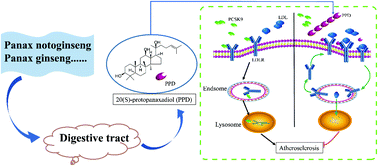20(S)-Protopanaxadiol decreases atherosclerosis in ApoE KO mice by increasing the levels of LDLR and inhibiting its binding with PCSK9†
Abstract
Chinese medicinal and edible plants such as Panax notoginseng and ginseng are widely used for the treatment of atherosclerosis (AS). AS is the main pathological basis of cardiac–cerebral vascular disease, which seriously threatens human health and quality of life. Low-density lipoprotein (LDL) is the main pathogenic factor of AS. The LDL receptor (LDLR) is an important protein that functions to mediate the uptake and degradation of plasma LDL. Proprotein Convertase Subtilisin/Kexin Type 9 (PCSK9) can mediate the internalization and degradation of LDLR. So, increasing the LDLR level by inhibiting PCSK9 is an important means of prevention and treatment of AS. In this study, by combining interaction technology (surface plasmon resonance, SPR) of small molecule compounds with membrane receptor proteins, cell experiments, and in vivo experiments, it is proved for the first time that 20(S)-protopanaxadiol (PPD), as a hydrolytic product of Panax notoginseng saponins in the intestinal tract, can bind to the extracellular domain of LDLR and inhibit the role of Proprotein Convertase Subtilisin/Kexin Type 9 (PCSK9) in mediating LDLR degradation. The results showed that PPD significantly reduced aortic plaques and hepatic steatosis in HFD-fed ApoE KO mice. LDLR protein levels were elevated in the liver tissues isolated from PPD-treated HFD-fed ApoE KO mice and PPD-treated HepG2 cells. Our findings demonstrated that PPD significantly increased LDLR levels and reduced AS in the HFD-fed ApoE KO mice on account of LDLR degradation being inhibited by PPD inhibiting the interaction between PCSK9 and LDLR.



 Please wait while we load your content...
Please wait while we load your content...